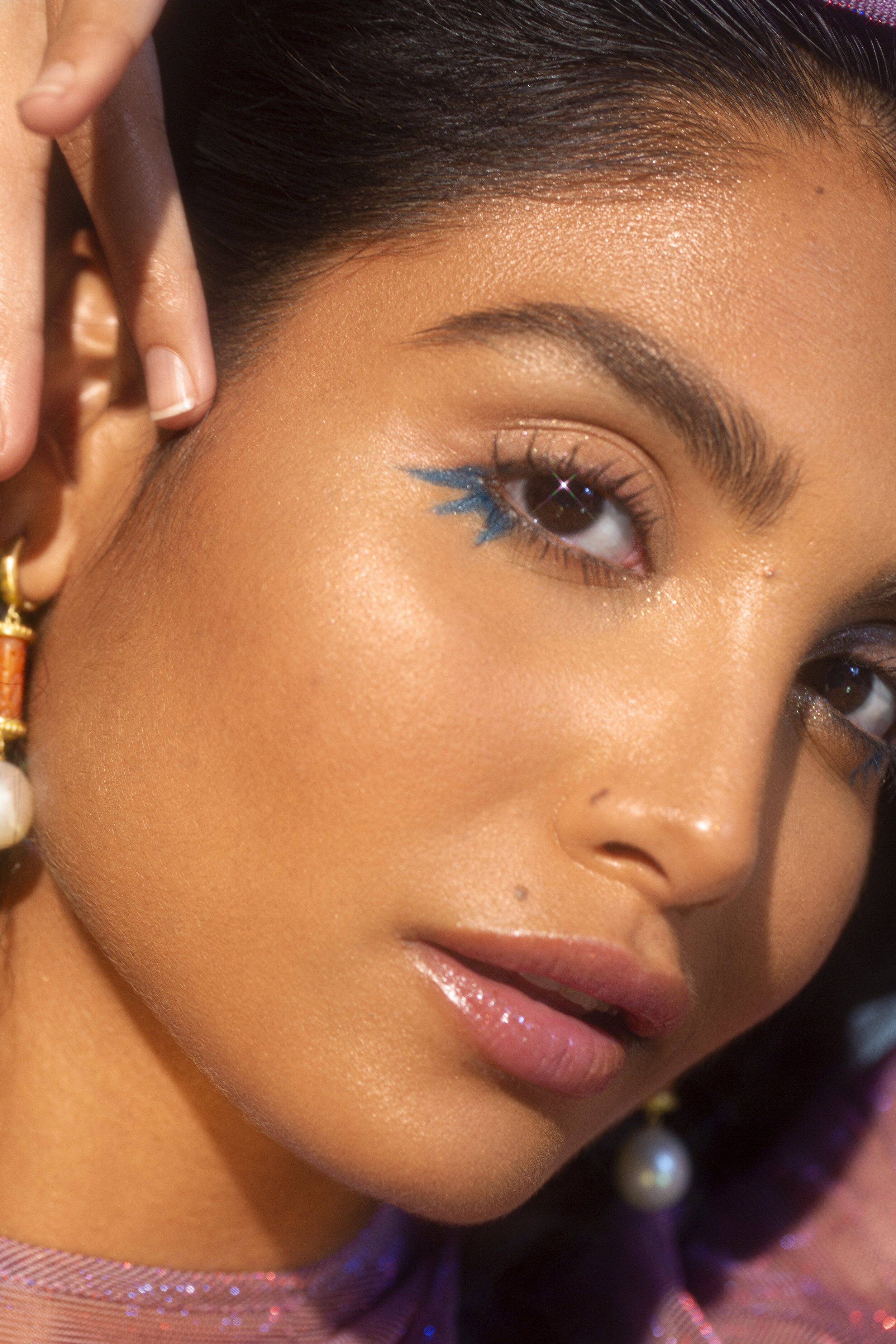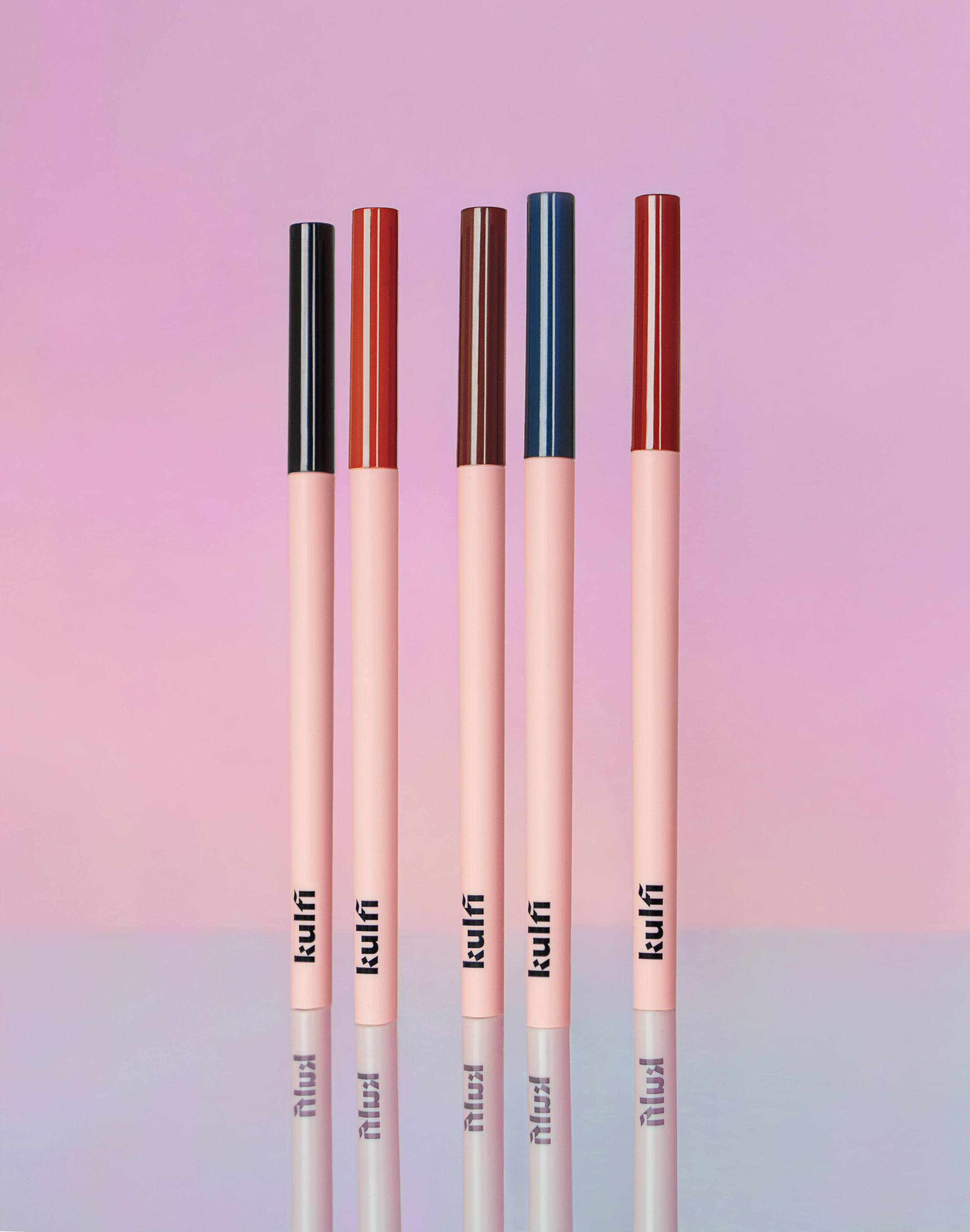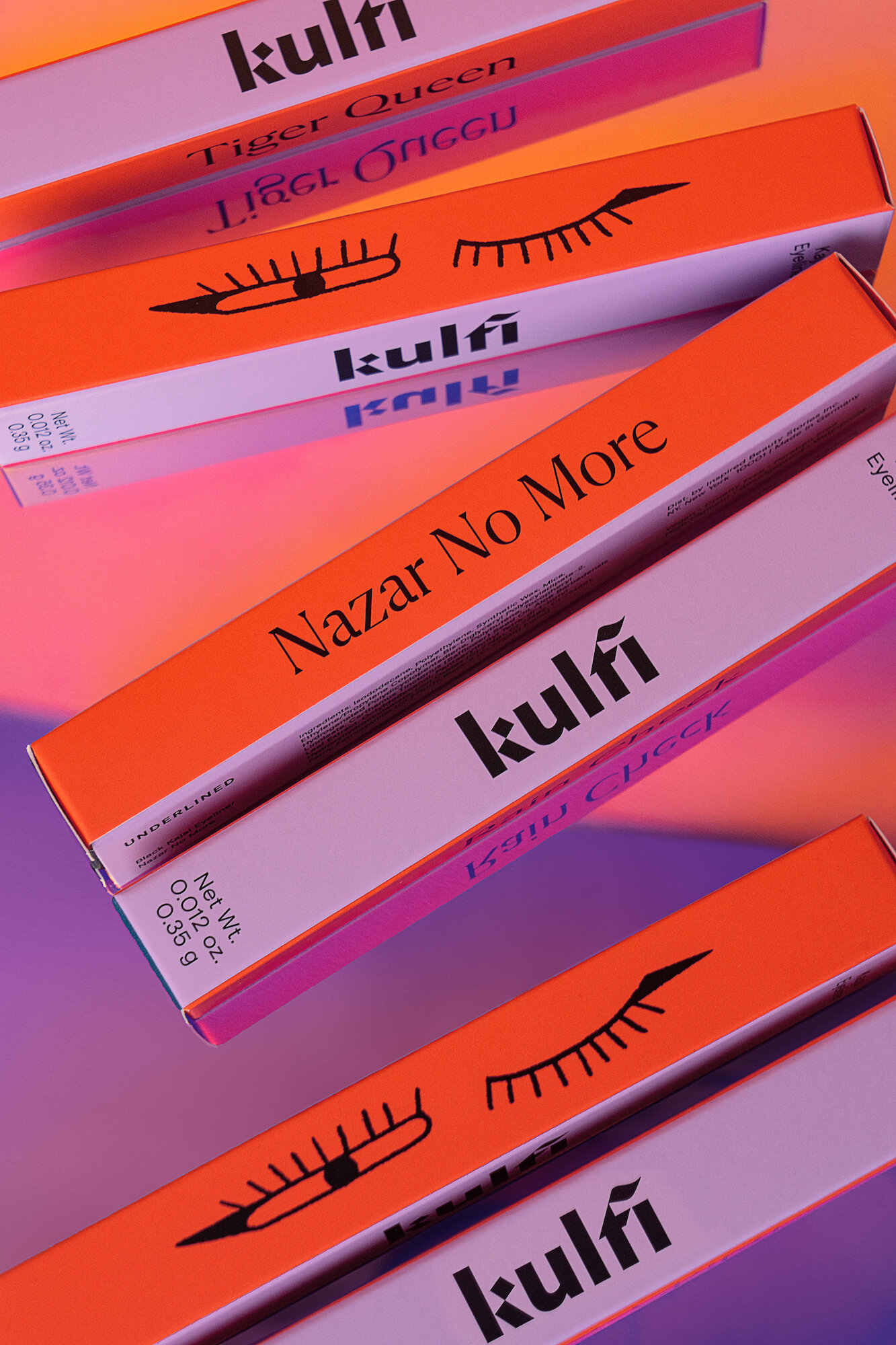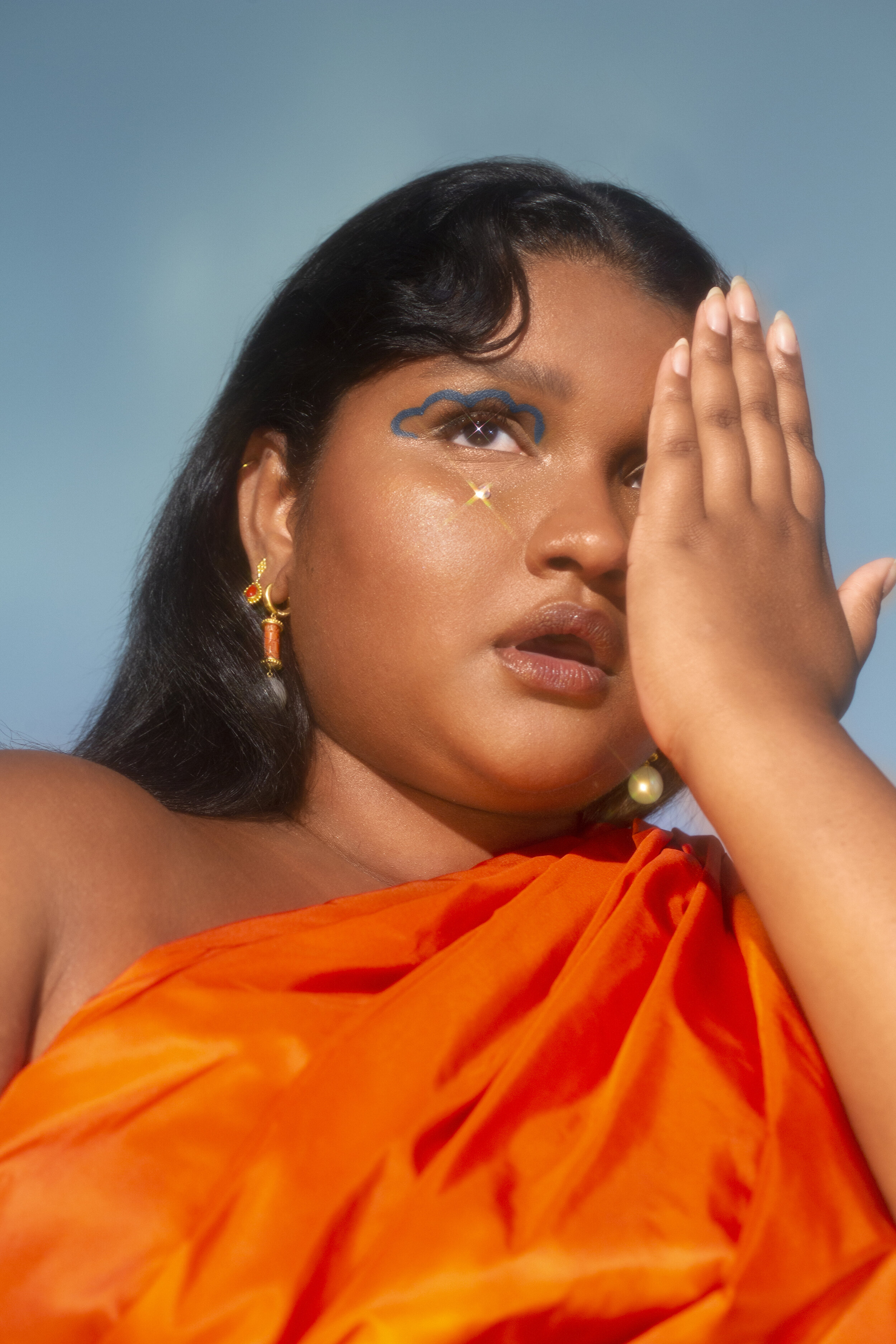This Entrepreneur Is Making the Beauty Industry More Inclusive, One Kajal Eyeliner at a Time
We know how daunting it can be to start a new business, especially if you’re disrupting an industry or creating an entirely new one. When there is no path to follow, the biggest question is, where do I start? There is so much to do, but before you get ahead of yourself, let’s start at the beginning. To kick-start the process, and ease some of those first-time founder nerves, we’re asking successful entrepreneurs to share their stories in our new series, From Scratch. But this isn’t your typical day in the life profile. We’re getting into the nitty-gritty details—from writing a business plan (or not) to sourcing manufacturers and how much they pay themselves—we’re not holding back.
Photo: Courtesy of Priyanka Ganjoo
Priyanka Ganjoo knows all too well what it feels like to be overlooked by the beauty industry. “Growing up in the South Asian community, my relationship with makeup and beauty was defined by Eurocentric standards and the patriarchy,” she tells Create & Cultivate. “It was only when I started working in the industry and playing with makeup that I discovered the joy of makeup and using it to express how I feel.“ Now, she’s on a mission to empower others who have also been alienated by the beauty industry to experience that same satisfaction and self-expression she found.
This past February, the Estée Lauder and Ipsy alum officially launched her own makeup brand, Kulfi Beauty, to center and celebrate South Asian beauty. Named after kulfi, a South Asian frozen dessert similar to ice cream, the brand’s first launch boasts an array of brightly hued kajal eyeliners not only designed to present beautifully on deeper skin tones but, more importantly, to encourage self-expression. “South Asian women can sometimes feel like we’ve been portrayed as the victim or needing charity,” explains Ganjoo. “I want to change that dialogue and present to the world an empowered South Asian who is not only comfortable in their own skin but thriving in it.”
Ahead, the founder and CEO reveals the extensive research she did before launching the beauty brand, the mistakes she’s learned from along the way, and the number one piece of financial advice she’d give to her fellow entrepreneurs.
Did you write a business plan? If so, was it helpful? If not, what did you use to guide your business instead? Why did you take that approach?
I didn’t write a business plan. I had worked in the beauty industry for years and was the general manager of IPSY Glam Bag, so I understood the high-level economics of the beauty business. I knew the problem I was trying to solve was massive and underserved. What I wanted to figure out was how?
Celebrating South Asian beauty was the mission from day one. In the initial months, I wanted to understand what that meant beyond me and my immediate circle of friends. I was part of a Facebook group with South Asian members, so I posted on the message board saying something like, “I’m building a beauty brand. Come talk to me.” I did hundreds of in-person interviews in New York, followed by online surveys with people across the world from Singapore to the UK. I wanted to know their attitudes towards beauty, the challenges they faced, the brands they loved, what they thought was missing.
I flew to Mumbai, India for a month to meet beauty entrepreneurs in India and even signed up for a Bollywood celebrity makeup artist workshop. I took this approach because if I wanted to create delight for our community, I had to understand the space first. Very quickly, it became clear to me that the alienation I had felt in the beauty industry had been felt by many across the world. That gave me the confidence and the data to dive right into building the foundations for Kulfi.
How did you come up with the name Kulfi Beauty, and what are some of the things you considered during that process?
“Kulfi” is a South Asian dessert, most similar to ice cream, and is made in so many fun colors and flavors. Some of my happiest childhood memories are eating kulfi during summer in Delhi. So, the name came out of two very personal emotions tied to the brand: celebration and joy.
South Asian women can sometimes feel like we’ve been portrayed as the victim or needing charity. I want to change that dialogue and present to the world an empowered South Asian who is not only comfortable in their own skin but thriving in it. Growing up in the South Asian community, my relationship with makeup and beauty was defined by Eurocentric standards and the patriarchy. It was only when I started working in the industry and playing with makeup that I discovered the joy of makeup and using it to express how I feel.
Kulfi was the working name for the brief I shared with my creative director, Badal Patel. We did a naming exercise too, where we came up with multiple options, but Kulfi just felt right for our brand personality. Some practical things I looked at were: can we get a global trademark? Can people pronounce it? Is it memorable? The wonderful thing is that while you’ll find it really hard to find any French word not trademarked in beauty (even brands that are not French want to sound French, and what does that say about the industry?), there are so many beautiful South Asian words that are viable options.
What were the immediate things you had to take care of to set up the business?
The first thing I did was incorporate. Then, I opened a business bank account, where I transferred all my personal savings. Once the brand name was finalized, I bought the domain kulfibeauty.com. I even reached out to the person who owns kulfi.com but they didn’t want to sell. I got the social channels I could, though we still don’t have consistent naming due to lack of availability across channels.
What research did you do for the brand beforehand, and why would you recommend it to fellow entrepreneurs?
I highly recommend researching through interviews, surveys, and focus groups. Some of the people I met through this process now follow the brand and are fans even before launch. They’ve been there from the start. The data from the research helped define my product roadmap.
In April 2020, we launched our digital platform Kulfi Bites. That’s been such an amazing resource. We share stories of relatable and aspirational South Asians. People started reaching out to us with their experiences. Now I regularly ask our community on Instagram for their inputs.
How did you find and identify the manufacturers that you work with? What advice can you share for fellow business owners on finding the right manufacturing partners?
Having a beauty industry network who work in product development helped. While I was at IPSY, I had attended trade shows with our procurement team and started to understand the landscape of manufacturers. That’s where I would start if I were starting from scratch: go walk the floor of a trade show (when they are on again).
Once I knew the products I wanted to launch, I got referred to a few best-in-class manufacturers. In my early conversations with them, I filtered based on who was open and excited to work with indie brands and small volumes. I submitted my product briefs to two manufacturers for each category and picked the one that was able to achieve the closest fit in formula I desired.
Last year, COVID made the product development process challenging for a small brand. We had long gaps in communication with our manufacturers. My advice would be to keep following up and building the relationship because your manufacturers are also trying to do their best and pivot their businesses in times of uncertainty.
How did you fund Kulfi and what path would you recommend to entrepreneurs today?
I self-funded the business with my personal savings until last year. Towards the end of last year, I raised an angel, friends-and-family round to support our investments this year. The process was initially intimidating. I had never fundraised before. It was very time-consuming because you are sending a thousand emails, pitching on hundreds of calls, and then following up and following up again until the money is in your account. You hear “no” 99% of the time but you still pitch the next person with the same enthusiasm.
Whether to fundraise or not is a personal and business decision with a lot of factors at play. Even if you decide not to fundraise, going through the process is educational. Towards the end of the round, I was crystal clear about what I wanted and what I didn’t want my business to be. I also learned about the types of investors I want to bring with me on this journey.
Do you pay yourself, and if so, how did you determine what to pay yourself?
I don’t pay myself and I don’t plan to until we turn profitable. Every single dollar is going into the business. My partner is supporting my living expenses which is a privilege.
How big is your team now, and what has the hiring process been like? Did you have any hiring experience before this venture? If not, how did you learn and what have you learned about it along the way?
The first person I hired was our brilliant creative director. She’s a freelance creative director and we work on a consulting basis. I have a team of amazing interns who are helping me with marketing and partnerships. Our editor works full time on Kulfi. I’m hiring an operations specialist who will join us prior to launch. Most of the people on our team are members of our community who found Kulfi through word of mouth and wanted to help out. I had hiring experience at IPSY, where I built and led a team of nine people. What I consider when hiring is to look for the combination of passion for the company mission and the ability to execute. I’m being mindful about full-time hiring until we are profitable because I have to keep our burn rate low.
Did you hire an accountant? Who helped you with the financial decisions and setup? Are there any financial tools or programs you recommend?
I hired an accountant to help set us up on Quickbooks. We’re still very early, so I haven’t felt the need for external resources for financial planning. I make my budget on Google Sheets and try to stick to it!
What has been the biggest learning curve during the process of establishing your business?
Surrounding yourself with people who believe in you is so important to get you through the rejections and hard times. I had also heard this many times, and it’s true: everything takes twice as long and is twice as expensive.
How did you promote your company? How did you get people to know who you are and create buzz?
Our marketing efforts have been very organic. We are building our digital platform Kulfi Bites through one on one conversations and with a community of writers who want to create representation. We got some great early buzz through an article on Allure that emerged from a conversation my friend Loni and I were having about Indian Matchmaking.
Do you have a business coach or mentor? How has this person helped? Would you recommend one? How do you get one?
When I have a business question, I go to some of Kulfi’s investors and advisors who are beauty entrepreneurs themselves. In the past year, I’ve built relationships with many entrepreneurs in the consumer space who are great resources.
I found them through networking during the fundraising process. I tapped my personal network. I applied to competitions and accelerators. Kulfi was selected for Supermaker and VentureCrushFG.
How has COVID-19 impacted your business operations and financials? What tactics and strategies have you put in place to pivot and ensure your business is successful through this period?
Our launch was delayed due to COVID. I was planning to fundraise in Q2 2020 but that was not an option anymore. My initial launch date was Q3 2020 but product development was delayed. I focused my energy on what I could do: building community. We built and grew our digital platform Kulfi Bites in this time, which has helped establish what our brand stands for. We held online events with our community. For example, we had a panel with South Asian women in entrepreneurship. I got on a phone call with almost everyone who wrote in. While it can be frustrating to see your plans disrupted, I’m grateful for the space it gave me to grow Kulfi in such an organic way.
What short-term changes will be crucial to your business strategy long-term post-COVID-19 and what plans are you making for when we get back to “normal?”
I think the biggest change is how I think about physical retail. I want Kulfi to be where the customer is. Before COVID, physical retail was a big part of the customer journey. During the pandemic, some of that traffic has shifted online and brands overinvested in physical retail have suffered. I do believe consumers will go back to stores again, but it’ll be crucial to find the right timing.
What advice can you share for small business owners, founders, and entrepreneurs who are also reeling in response to COVID-19?
In March/April 2020, I definitely had a moment where I thought to myself: should I even continue building Kulfi? I’m so glad I pushed through the challenges and uncertainty. This isn’t the answer for everyone. But if you still have the passion for your business and the means to support yourself through these difficult times, keep going.
What is one thing you didn’t do during the setup process that ended up being crucial to the business and would advise others to do asap?
I wish I had started working on multiple products in the early days. Product development takes a long time and now I can’t spend as much time as I want on it with marketing, operations, and fundraising taking up a lot of my time.
For those who haven’t started a business (or are about to), what advice do you have?
Just do it! You only learn by doing. When you put your heart and soul into it, people see that and are attracted to it.
What is your number one piece of financial advice for any new business owner and why?
Assume you’ll never raise money. Build your business to achieve profitability with the runway you have.
If you could go back to the beginning with the knowledge you have now, what advice would you give yourself and why?
I would say to myself: believe in yourself. Surround yourself with people who believe in you.

















